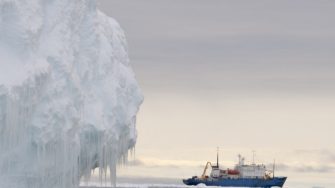
Overview
The UNSW Environmental Change (GEOS3761) course delves into some of the great scientific and archaeological questions about what happened on Earth and why. Past environmental changes provide valuable insights into how our planet works and what this means for the future. Throughout this course, you’ll be provided with a critical understanding of these environmental changes and their impacts.
The course is delivered using a mixture of short films, eBooks, quizzes and virtual field trips. You’ll be introduced to key events from our planet’s history whilst also developing critical thinking and communication skills. You’ll employ techniques that provide important insights into how our planet works in the past, present and future.
Course breakdown
Due to increased greenhouse gas concentration in the atmosphere, the climate is changing: heatwaves, droughts, floods are becoming more frequent and more intense, ice-mass loss from Greenland and Antarctica is accelerating and sea-level is rising. Future climate projections are derived from climate model simulations, but how are these models benchmarked? Past climate changes provide a unique opportunity to understand the climate system to better project its trajectory. This course provides an overview of past climate and environmental change and of the processes that were involved.
This course covers the following topics:
Current and future climate change
Glacial/interglacial cycles
Abrupt climate change and the role of the oceanic circulation
Tipping points
Past warm periods of the Quaternary and deep time
C14 and dating methods
Nature-based solutions to environmental change
Conditions for enrolment
Environmental Change is a Stage 3 course and contributes to the Geography major in the Bachelor of Science (3970), Physical Geography major in the Bachelor of Advanced Science (Honours) (3962) and the Bachelor of Environmental Management (3965).
There are no mandatory activities or field components.
Career opportunities
Earth science takes a complete view of our planet; it pulls together different disciplines to try to get a better understanding of how our world works. Earth science isn’t just interested in what’s below our feet and why it’s there but looks at how geology, the air, oceans, ice and life itself are all connected.
How quickly do melting ice sheets raise sea level? What impact do volcanic eruptions have on the carbon cycle? If the planet’s wind belts get stronger, what happens to the ocean currents and sea ice? Earth science makes links and answers questions that a single discipline struggles to tackle.
At UNSW Science, you can become an expert in this field by specialising in the major: Earth Science.
Relevant roles
- Meteorologist
- Geologist
- Geophysicist
- Hydrologist
- Ecologist
- Environmental scientist
- Natural resource manager
- Marine scientist
- Marine biologist
- Environmental scientist.
It’s important to note that this course offers a wide range of key skills and capabilities that you can use in the future, regardless of whether you pursue a career in science or not.
What our graduates say
“What I liked about Environmental Change was how it took the complicated concept of environmental change and explained the forces behind it using really interesting and relevant examples.”
- Priya O’Brien, Bachelor of Advanced Science (Honours), Major in Geography graduate.
